Memories from a Romany Childhood P9 by Chris Smith
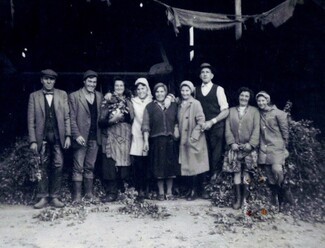
This week we are pleased to bring you the ninth story in the series ‘Memories from a Romany childhood' by Romany Musician and previous TT manager, Chris Smith from Herefordshire.
The summer of 1976 was one of the hottest on record. The UK experienced ten consecutive weeks of uninterrupted sunshine, causing a major drought with water being rationed across the country. Farmers, however, were allowed to irrigate their crops, oftentimes taking the water directly from local rivers until many nearly ran dry. We lived near the river Frome, a beautiful stretch of water that meandered through some stunning countryside that we took for granted.
I didn’t always appreciate being brought up in a rural community. Towns and cities held a fascination due to the number of people they had. I found it hard to imagine that anyone could ever be bored if they lived in a city. Rural life was much slower, time literally ticked by, especially on weekends.

The thing I remember most about Sunday’s is waking up to the smell of kippers frying in the pan. I would lay in bed until the last moment before Mam insisted that it was time to get up. After a late breakfast, Dad, me uncle Aldy and my brother Len would go to the pub, leaving Mam to cook the dinner, and me to play my ever-growing record collection, or listen to the radio.
Mississippi by pussycat was one of the big hits of the summer, and seemed to be playing pretty much constantly, along with Save Your Kisses for Me by Brotherhood of Man which had won the Eurovision Song Contest a couple of months earlier. Save your Kisses had a neat little dance that went with it which everyone seemed to know.
It was during this summer that I realised I could sing. One of the ways a teenager could earn money was through picking fruit. Yarkhill Farm grew strawberries and black currents in abundance. Many other Travelling families stopped on the farm between June and the end of September. They would arrive for the strawberry picking and most would stay until the hops were harvested.
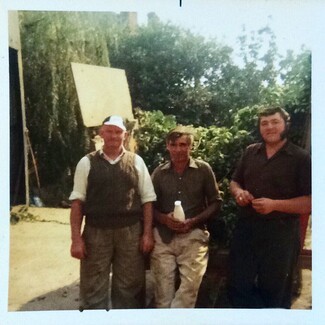
I loved picking blackcurrants and was good at it. My only concern was whether I had enough money to go into Hereford on Saturdays and buy another record. To keep amused whilst picking I would sing the hits of the day. This would often turn into a competition with a couple of the Lee family raklies who could also sing well.
Joanie Lee, a large Romany woman who could work as hard as any man, said to me mam one day as they were queuing for the weighing scales, “Your boy can really sing Betty”. Me Mam glowed with pride as she always did if one of her children was complimented.
The Lee Family, along with the Boswell’s and our relatives the Johns Family from Evesham were regular visitors to Yarkhill Farm for the picking season. Most of the farms in the area received and welcomed Travellers during this time. Travellers made up the majority of the workforce and were valued due to our work ethic. The same families went back to the same farms year after year and were well known by the local people.
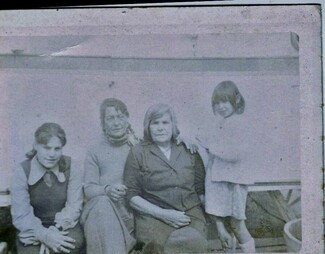
As summer drifted almost imperceptibly into autumn, hop picking started in earnest. Mam didn’t enjoy working in the hop picking machine shed, preferring instead to work in the hop garden out in the fresh air. She would mainly be on the back of the hop trailer laying the scratchy bine’s neatly in the trailer, working side by side with me Dad.
Hop picking usually began straight after the late August bank holiday, and in those days would last approximately six weeks. Fuggles, Northdown, Golding, and Challenger hops were the main types that were grown in Herefordshire. My brother Len, worked in the hop drying kilns, that were hot, stuffy, and had an overwhelming aroma of sulphur that was used in the drying process. The job was hard and they often had to work through the night in order to keep up with the pickers. Len went on to become one of the the best known hop dryers in the country, winning many awards.
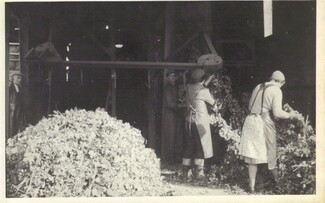
Clive Bennet, Doreen Scott’s partner, worked in the crows nest, a metal construction that was lifted and attached onto the back of the trailer. Clive would climb up inside the crows nest and cut the hop bine’s from the top whilst me Mam and Dad would pull the bine’s into the trailer. Occasionally Mam would take a break from bine pulling to walk behind the tractor and trailer picking up ‘flags’, that were actually hop sprays that had fallen to the ground.
One day, Clive lost his grip on the extremely sharp hook he used, and it went spinning out of his hand towards mam. She was bending down at the time and didn’t see it coming. Luckily, it was the wooden handle that hit her on the head and knocked her out briefly. Had it been the blade, she probably wouldn’t have been around to tell the tale later.
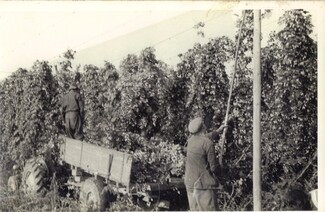
My favourite time was the evening after the picking day was over. The pickers would gather around an iron grate that stood raised on metal legs, and was known as a ‘devil’. Ghost stories would be told in the fading light, extending well into the darkness, with only flames from the ‘Devil’s’ fire to illuminate the faces of the people there.
I would sit and listen quietly as the pickers told tales which sometimes stretched the imagination, but that often had a ring of truth about them. I would occasionally be too trashed to walk back to our trailer by myself, choosing to wait until another member of the group headed in the right direction.
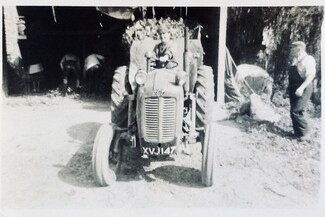
Most years during this time we were visited by Pakistani and Indian men who would be selling brightly coloured blankets, throws, and tablecloths out of the back of their cars or vans. They did a lot of business with the Travelling people and their goods were exceptionally well made.
One Sunday afternoon an extremely handsome Pakistani man and his wife arrived at our tan. As he opened up the back of his car for us to peruse his goods, he asked Mam politely for a drink of water for his heavily pregnant wife, who was sat in the front passenger seat.
Mam looked at me and said, “Jal akie and get the Moosh some parnie”. The man’s face lit up with a brilliant smile and he said: “You speak our tongue!” He went on to say that our people and his must-have similar heritage, as we shared many words in our languages. It was the first time I realised that we had a history that was not at the time widely known. Mam bought several of the blankets, that I still have and use, and look as good today as they did nearly fifty years ago.
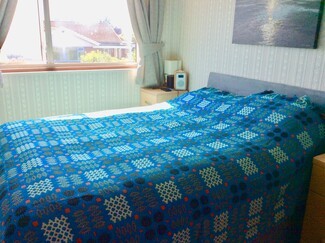
Main photo: Travellers in the hop picking shed at Yarkhill Farm 1976 Left to right: Chris Smith's Uncle Nelson Johns, Joey Johns, Joanie Lee, Missy Johns, Chris Smith's aunt Mimy Johns, Mrs Boswell, Mr Boswell, Boswell family member and betty Johnss (c) All photos courtesy of Chris Smith